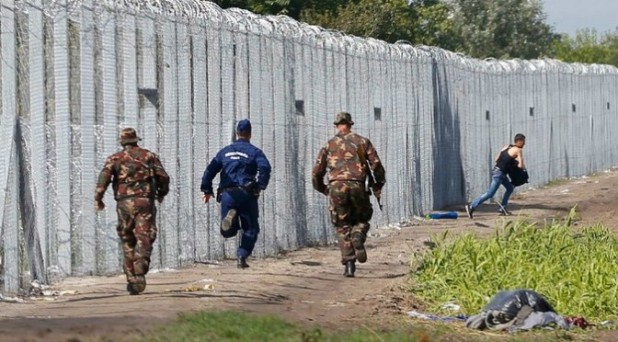Steve Sailer
VDARE
September 14, 2015
From the NYT:
Eastern Bloc’s Resistance to Refugees Highlights Europe’s Cultural and Political Divisions
By RICK LYMAN SEPT. 12, 2015
WARSAW — Even though the former Communist countries of Central and Eastern Europe have been asked to accept just a fraction of the refugees that Germany and other nations are taking, their fierce resistance now stands as the main impediment to a unified European response to the crisis.
Poland’s new president, Andrzej Duda, has complained about “dictates” from the European Union to accept migrants flowing onto the Continent from the Middle East and Africa.
Slovakia’s prime minister, Robert Fico, says his country will accept only Christian refugees as it would be “false solidarity” to force Muslims to settle in a country without a single mosque. Viktor Orban, Hungary’s hard-line prime minister, calls the influx a “rebellion by illegal migrants” and pledges a new crackdown this week.
The discord has further unsettled a union already shaky from struggles over the euro and the Greek financial crisis and now facing a historic influx of people attracted by Europe’s relative peace and prosperity.
When representatives of the European Union nations meet on Monday to take up a proposal for allocating refugees among them, Central and Eastern Europen nations are likely to be the most vocal opponents. Their stance — reflecting a mix of powerful far-right movements, nationalism, racial and religious prejudices as well as economic arguments that they are less able to afford to take in outsiders than their wealthier neighbors — is the latest evidence of the stubborn cultural and political divides that persist between East and West. …
Few migrants, in fact, are particularly interested in settling in Eastern Europe, preferring to head to Germany or Scandinavia, where social welfare benefits are higher, employment opportunities greater and immigrant communities better established. In that sense, migrants are aligned with leaders in Eastern and Central European capitals, who frequently argue that the 28-member bloc should focus first on securing its borders and figuring out a way to end the war in Syria before talking about mandatory quotas for accepting refugees.
But that’s not the point, the point is to use the Muslim influx to crush resistance in Eastern Europe.
But as often as not, the political discourse in these countries has quickly moved toward a wariness of accepting racial and religious diversity.
“This refugee flow has outraged the right wing,” said Kenneth Roth, executive director of Human Rights Watch. “If you scratch the surface, why are they so upset? It’s not about jobs or the ability to manage them or social welfare. What it is really about is that they are Muslim.”
Unlike countries in Western Europe, which have long histories of accepting immigrants from diverse cultures, the former Communist states tend to be highly homogeneous. Poland, for instance, is 98 percent white and 94 percent Catholic.
“And the countries that have very little diversity are some of the most virulently against refugees,” said Andrew Stroehlein, European media director for Human Rights Watch.
But we have a plan for fixing that.
Even mainstream political leaders eager for closer ties to Brussels, the European Union’s headquarters, feel pressure to appeal to this growing nationalist wave.
“By toughening up their rhetoric and showing a strong hand toward the Roma minority, facing down the E.U. and refusing a common solution to the refugee crisis, they are trying to outbid the far right and keep the traditional political parties in power,” said Zuzana Kusá, a senior research fellow at the Institute for Sociology of the Slovak Academy of Sciences.
It’s called representative government.
In Hungary, Mr. Orban has taken a particularly uncompromising approach, demanding more help from Brussels in dealing with the tens of thousands who continue to enter his country while insisting that Hungary is under no obligation to endanger its traditional Christian values by accepting large numbers of Muslims.
Advice to Mr. Orban: When talking to the American media, don’t say “our traditional Christian values,” say “our traditional Judeo-Christian values.”
What exactly is all this frenzy to crush Eastern European dissent about, anyway?
Part of it, no doubt, is to inflict upon the East the bad decisions made in the West. The East can’t be allowed to learn from the mistakes of the West, because that would signify that the decisionmakers in charge in the West have made mistakes. And that would raise questions about whether they should be replaced with better decisionmakers. And we can’t have that.
If you are Japan, China, South Korea, or Taiwan, pay attention to what’s going on. You may think you are insulated, but, if, say, Hungary can be broken on the Wheel of Diversity, your time may come, too.
 Daily Stormer The Most Censored Publication in History
Daily Stormer The Most Censored Publication in History



